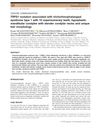3 citations,
March 2023 in “International journal of molecular sciences” Keratin protein production in cells is controlled by a complex system that changes with cell type, health, and conditions like injury or cancer.
3 citations,
October 2023 in “Cosmetics” Healthy lifestyle changes can significantly improve skin health as you age.
August 2021 in “Consilium medicum” COVID-19 may worsen hair loss, but treatments like minoxidil can help.
3 citations,
July 2023 in “Biomolecules” B2m-free HLA variants may be a new class of HLA important in immune responses and diseases.
26 citations,
December 2019 in “Indian Journal of Dermatology, Venereology and Leprology” PRP combined with minoxidil is the most effective and safe treatment for male pattern baldness.
1 citations,
October 2022 in “Bioengineering” Keratin helps skin cells mature when added to a collagen mix, which could be important for skin and hair health.
Researchers made a mouse model with curly hair and hair loss by editing a gene.
 17 citations,
December 2015 in “BMC Complementary and Alternative Medicine”
17 citations,
December 2015 in “BMC Complementary and Alternative Medicine” A new plant extract from Avicennia marina could potentially be used to treat common hair loss.
 9 citations,
April 2020 in “Journal of dermatology”
9 citations,
April 2020 in “Journal of dermatology” A person with a specific gene mutation had extra teeth, unique jaw and hair features not seen before in this condition.
 14 citations,
January 2016 in “Biochemical and Biophysical Research Communications”
14 citations,
January 2016 in “Biochemical and Biophysical Research Communications” Ginsenoside Re from ginseng may help hair grow by blocking a specific growth-inhibiting pathway.
1 citations,
December 2022 in “Plants” CSLD1 suppresses rice root hair growth with NH4+ and regulates AMT1;2 expression.
January 2018 in “Indian Dermatology Online Journal” DM and AA may share a common cause.
 18 citations,
April 2013 in “PLOS ONE”
18 citations,
April 2013 in “PLOS ONE” Mice with autoimmune hair loss showed signs of heart problems.
 10 citations,
July 2013 in “British Journal of Dermatology”
10 citations,
July 2013 in “British Journal of Dermatology” High MUC-18/MCAM levels in blood indicate a worse outlook for melanoma patients.
Autoimmune Polyendocrine Syndromes involve specific combinations of autoimmune diseases.
 109 citations,
May 2011 in “Dermatologic Therapy”
109 citations,
May 2011 in “Dermatologic Therapy” Alopecia areata is a type of hair loss that can lead to complete baldness, often associated with other autoimmune conditions, and half of the cases may see hair return within a year.
 19 citations,
December 2008 in “Medical Journal of Australia”
19 citations,
December 2008 in “Medical Journal of Australia” Baldness does not affect vitamin D levels in men.
31 citations,
September 2003 in “International Journal of Dermatology” Vitamin D-dependent rickets Type II causes bone problems and hair loss, and doesn't improve with Vitamin D treatment.
 1 citations,
August 2023 in “Gels”
1 citations,
August 2023 in “Gels” The hydrogel with silver and ibuprofen promotes wound healing and fights infection.
 13 citations,
September 2020 in “International Journal of Molecular Sciences”
13 citations,
September 2020 in “International Journal of Molecular Sciences” PRP therapy and minoxidil combo works best for male hair loss.
1 citations,
August 2024 in “Animals” KRT85 gene variations can help improve wool traits in sheep through selective breeding.

Activin A promotes ear hair cell development, while follistatin delays it.
 3 citations,
January 2022 in “Pharmaceutics”
3 citations,
January 2022 in “Pharmaceutics” Nanostructured delivery systems could potentially improve hair loss treatment by targeting drugs to hair follicles, reducing side effects and dosage, but the best size, charge, and materials for these systems need further investigation.
 August 2022 in “Journal of Comprehensive Pediatrics”
August 2022 in “Journal of Comprehensive Pediatrics” A girl with a rare genetic disorder had a unique bone condition, highlighting the need for careful diagnosis and suggesting the disorder might be more common than thought.
 43 citations,
August 2010 in “Expert Opinion on Investigational Drugs”
43 citations,
August 2010 in “Expert Opinion on Investigational Drugs” Inhibitors of 11β-HSD1 show potential for treating type 2 diabetes but require more testing for safety and effectiveness.
 8 citations,
July 2019 in “Pure and Applied Chemistry”
8 citations,
July 2019 in “Pure and Applied Chemistry” Some natural compounds from Iris plants can block enzymes related to certain disorders, with a few affecting both targeted enzymes.
 54 citations,
May 2018 in “Journal of The European Academy of Dermatology and Venereology”
54 citations,
May 2018 in “Journal of The European Academy of Dermatology and Venereology” Low level laser therapy works best for hair loss, followed by PRP, finasteride, and minoxidil.
 2 citations,
January 2019 in “Annals of dermatology/Annals of Dermatology”
2 citations,
January 2019 in “Annals of dermatology/Annals of Dermatology” A patient experienced permanent hair loss due to an allergic reaction to a corticosteroid injection.
December 2022 in “Scientific Reports” Compound 4 is a promising treatment for hair loss with low toxicity.
 3 citations,
May 2018 in “Experimental Dermatology”
3 citations,
May 2018 in “Experimental Dermatology” Young HS patients often have other physical and mental health issues, and research on HS covers a wide range of topics including genetics, triggers, treatments, and the need for more data.
















